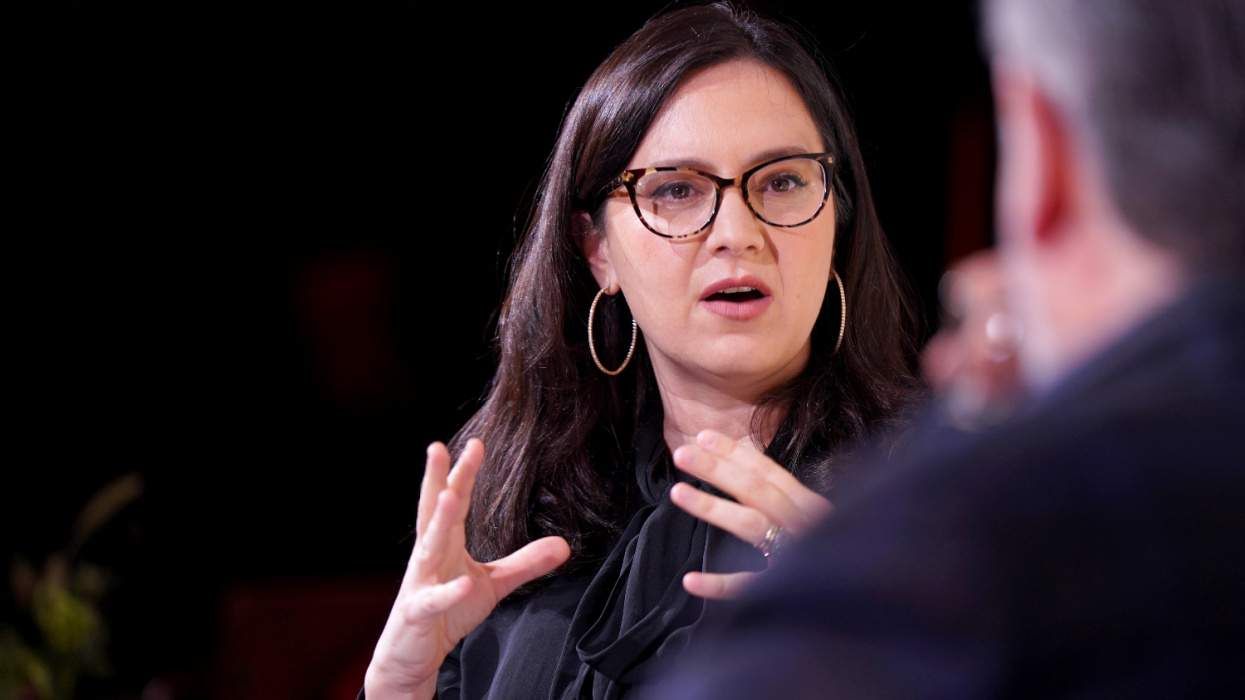On World AIDS Day, December 1, a group of executives from the Ford Motor Co. gathered at the United Nations in New York for an awards ceremony honoring companies and individuals who have shown significant leadership in the fight against HIV/AIDS. There the automaker's education programs in China, Russia, Thailand, and India were lauded by the National HIV/AIDS Partnership. It was another example of the automaker's longtime support of progressive causes, including a lengthy pro-gay record.
Only a week earlier, however, Ford executives had held a secret meeting with the antigay American Family Association inside the group's Tupelo, Miss., headquarters. The AFA began threatening a boycott of the automaker in May 2006 because of its diversity training program, health benefits for employees' same-sex partners, donations to LGBT organizations, and advertising in LGBT publications. The AFA had suspended its boycott threat in June and now wanted a resolution--or else.
Zealous AFA chairman Donald Wildmon, who has a long track record of calling boycotts to advance far-right interests, had a couple of conservative Ford executives on hand who might just listen to his demands: David Leitch, the carmaker's general counsel, and Ziad Ojakli, its vice president of corporate affairs.
Leitch is a former deputy counsel to George W. Bush, while Ojakli is a former member of the president's staff and is reportedly a major GOP donor. He also worked as a Senate liaison for the Bush-Cheney transition team as well as a legislative assistant to archconservative U.S. senator Dan Coats of Indiana.
Shortly after that meeting, on November 30, the AFA proclaimed a victory on its Web site, claiming that it convinced Ford to stop advertising its Jaguar and Land Rover brands in such gay publications as The Advocate.
After Sirius OutQ News and Advocate.com broke the news of Ford's apparent deal with the AFA, the mainstream media picked up the story and all hell broke loose. Dealers with predominantly gay and lesbian clientele were fielding angry calls from their customers. Gays and lesbians, reeling at the betrayal, contemplated boycotts of their own. And Comedy Central's The Daily Show and other cultural commentators turned the company into a laughingstock.
Seven national gay rights organizations arranged a meeting with Ford executives, including chairman Bill Ford Jr., on December 12. Two days later Ford reversed its decision, and gay rights groups backed off. "On this march toward equality, there will be occasions when companies hit a bump in the road," says Joe Solmonese, president of the Human Rights Campaign. "What's important is how they get themselves out of that situation."
Activists were stunned that the number 2 carmaker in the United States--so protective of its image as a supporter of gay causes--became tangled in a public relations mess with the conservative American Family Association in the first place.
During the past couple years, progressive companies have told antigay groups to take a hike when threatened. When Nike Inc., which is based in Beaverton, Ore., publicly supported the state's civil unions bill in June 2005, the company stood its ground despite threats from the Right.
Ford continues to pay dearly for its public dithering.
It remains under the renewed threat of an AFA boycott and is trying to smooth over its image with gay and lesbian consumers. A recent online survey by GayTrendsetters.com and LesbianTrends.com found that nearly 66% of users who said they had leased or owned a Ford vowed they would not do so again based "upon the perceived anti-GLBT policies by the company."
What remains most striking about the developments is the AFA's ability to infiltrate Ford and nearly overturn the company's decade-long support of equality.
Why the AFA decided to target Ford remains a mystery. DaimlerChrysler and General Motors advertise in gay publications, provide domestic-partner benefits, and sponsor LGBT events. Like Ford, DaimlerChrysler has a perfect score of 100 on the HRC's Corporate Equality Index. GM scores a respectable 86.
Jeff Stoltman, associate professor of marketing at Wayne State University in Detroit, speculates that the AFA chose Ford as a target either for personal reasons or because the company was seen as vulnerable and willing to negotiate.
That has been the AFA's modus operandi in the past. The group canceled a boycott of Target Corp. in December 2005 after the retailer said it would use words such as Christmas and Hanukkah in its advertising: The AFA had objected to the company's use of the more inclusive--but nonreligious--word holiday.
The AFA went after Target "with a vengeance" after the corporation prohibited the Salvation Army from collecting donations outside its stores, Stoltman says. "They used the Salvation Army decision by Target as the rallying cry internally. They push the buttons, whether bell ringers in front of Target or Ford Motor Co.'s policies, that get the loudest horn to go off internally to get their own troops rallied."
Despite AFA's claims, its boycotts aren't always successful. In April the group ended its eight-month boycott of Procter & Gamble Co., saying the maker of Crest toothpaste and Tide detergent had stopped advertising on TV shows such as Will & Grace and Queer Eye for the Straight Guy. In reality, Procter & Gamble continued its advertising.
"We advertise on shows like these because they are among the most popular and widely watched programs on television, plus [they] reflect the diversity of our nation," says Procter & Gamble spokesman Scott Stewart. "While we don't just advertise on any program, we don't believe the presence of a gay character on a program means we should automatically avoid it."
The AFA's nine-year boycott of the Walt Disney Co. for offering domestic-partner benefits didn't hurt the Mouse House financially. During the boycott Disney reported record profits and exceeded expectations on Wall Street.
Still, conservative Christian groups tap into a sizable base. About 10% to 15% of adult Americans describe themselves as evangelical Christians, says Nancy Ammerman, professor of sociology of religion at Boston University. The AFA alone has close to 200 radio station affiliates under the American Family Radio name and boasts 2 million online supporters.
When a religious group declares a boycott, Ammerman says, it may be less about economics and more about defining what the group believes in. "It is both assuring members of the group who they are and declaring to the rest of the world who they are," says Ammerman.
Adds Stoltman: "The thing about any boycott is, once you show the slightest wrinkle of weaknesses, from then out all bets are off. It's a crisis of your own making."
The unusually strong show of unity among LGBT groups reflects how alarmed they were by suspicions that a corporate ally had caved to pressure by one the most vocal antigay groups in the nation. "Anyone who works in the gay community understands AFA's history of misrepresenting the LGBT community," says Sandra Telep, an organizer with Pride at Work, an AFL-CIO affiliate for LGBT workers. "And it was important to all of us that those lies were not legitimized by a national company."
New York State comptroller Alan Hevesi, who controls more than 9.4 million shares of Ford stock on behalf of the state, wrote Bill Ford Jr., asking what cost-benefit analysis justified giving into a "bigotry-based" threat.
"It was a PR debacle," says Gordon Wangers, president of Automotive Marketing Consultants Inc. "The problem was that Bill Ford has publicly declared time and again that Ford is a progressive and socially aware company. So it was off strategy to pull advertising from gay and lesbian media. Their decision was 180 degrees off their stated position."
Two days after meeting with gay rights leaders, Ford sent its letter reaffirming its commitment to policies that support LGBT workers and said the company would support "certain" LGBT events. The letter also said the corporate parent would not force its Jaguar and Land Rover divisions to advertise in gay media, but Ford would buy corporate ads in the publications.
"We have decided to run corporate ads in these targeted publications that will include not only Jaguar Land Rover but all eight of Ford's vehicle brands," reads the letter, signed by Joe Laymon, vice president for corporate human resources. "It is my hope that this will remove any ambiguity about Ford's desire to advertise to all important audiences and put this particular issue behind us."
Allan Gilmour, the gay retired vice chairman and chief financial officer of Ford, says he is confident that the automaker's decision to nix the Jaguar and Land Rover ads was driven by a retooled marketing strategy, not the AFA's threat of a boycott. He says Jaguar and Land Rover had decided to change advertising tactics before the AFA first made its threats. Jaguar, for example, left its longtime ad agency Young and Rubicam in February for rival Euro RSCG Worldwide in a well-publicized shakeup geared at rejuvenating sales of the luxury car unit.
But even Gilmour, who retired in 1994 after 34 years with the company, only to be asked back in 2002 for another three-year stint, acknowledges that he doesn't know exactly what was told to the AFA when Ford executives met with the group. Several members of Ford's LGBT employee association declined to comment, referring questions to the corporate headquarters, which also isn't talking. "We want the letter to speak for itself," says spokeswoman Kathleen Vokes.
Among those who are relieved by Ford's announcement are several dealers who say they were unaware of the controversy until after it made national headlines. "It wasn't like Ford kept us fully informed about what was going on," says Paul Thiel, managing partner of Palm Springs Motors in Cathedral City, Calif. Located next to a city where one in 10 couples identify as gay, Palm Springs Motors has what Thiel calls a "significant" gay clientele.
Joseph Clapsaddle, public and community relations manager for Hornburg Jaguar/Land Rover in West Hollywood, Calif., says he is "thrilled" that Ford will run corporate ads.
The fight doesn't appear to be over. Wildmon maintains that his organization and Ford had an agreement, which he says Ford broke. "All we wanted was for Ford to refrain from choosing sides in the cultural war," Wildmon said in a press release. "And supporting groups which promote same-sex marriage is not remaining neutral."















